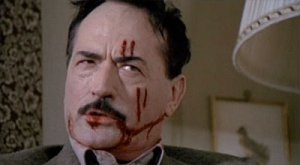The Boys From Brazil
Sunday, October 25th, 2009 • Horrorthon Posts / Horrorthon Reviews
This is really just shooting fish in a barrel, since this movie is such complete garbage, but I have to do it anyway because I’m puzzled and troubled by a surrounding set of phenomena that seem to have some bearing on the broader questions concerning literary vs. cinematic horror, adaptations, suspense plotting, and the evolving styles and techniques of Hollywood moviemaking. Or maybe not; maybe this is just a bad ‘seventies movie and I’m over-thinking it; I can’t tell. Let me attempt herewith to explain where I’m coming from:
I’ve just finished co-writing a supernatural thriller with a reasonably intricate structure. Although I’d encountered the elements of suspense writing in a few other instances, this was my first time really going for the scares and the suspenseful tricks and gimmicks necessary to create that particular “can’t put it down” addictive effect that we all enjoy from this kind of story. While working (endlessly) on the book’s plotting, my co-author and I found ourselves constantly referring to other books we both liked, as examples of what does and doesn’t work. Stephen King was mentioned very often, as was Michael Crichton (by me; I have a particular lifelong admiration for Crichton which I admit is excessive and a bit delusional). But probably the most frequently-invoked suspense author was Ira Levin, the author of Rosemary’s Baby, The Stepford Wives and The Boys From Brazil. Levin (like King, and Crichton) is not a particularly gifted literary writer; his workmanlike style is less obtrusively classless and coarse than King’s (and less coldly, inhumanly clinical than Crichton’s), but it’s not what anyone would call good writing. However, as the my three examples illustrate, Levin is an absolute master of suspense.
All three of these books were made into movies, of which only one (Rosemary’s Baby) is any good. In Stephen King’s (highly recommended) book-length essay on the horror genre, Danse Macabre (1981), King spends a chapter analyzing his favorite horror novels and bringing his particular insights to bear in understanding why those books are so scary; why they’re so good. (He spends another chapter on his favorite movies, and another on television shows—the whole thing is definitely worth reading.) Rosemary’s Baby is one of King’s favorite horror novels and he intersperses his analysis with a lengthy interview he conducted with Ira Levin. In that interview, Levin reveals his suspicion that Roman Polanski, the writer/director of Rosemary’s Baby (1968), was so new to the ways of Hollywood that he may not have even grasped that he was allowed to change the book while filming it. For this reason (Levin speculates) the movie is almost neurotically faithful to its source, down to the specific issues of magazines being read by the characters, the colors of the walls in certain rooms, and, of course, nearly all of the dialogue and other scenic material.
The novels The Stepford Wives and The Boys From Brazil are every inch Rosemary’s Baby’s equals in terms of ingenuity, quality, and the number and intensity of scares and chills. But the movies made from those two books are just awful, and the movie of The Boys From Brazil is uniquely dismal (which is why we’re here). The difference, of course, is that those two movies don’t really bother to follow their source material with any real care. (It doesn’t help that Franklin J. Schaffner, the director of The Boys From Brazil, is such a hopelessly talentless hack.) What is it about screenwriters who adapt novels by acknowledged masters of suspense that makes them change the plotting around? It must be ego-driven, or there must be some kind of pathological need involved. The same thing happens to Stephen King: Pet Sematary and Misery are two of the most terrifying, flawlessly-plotted horror stories I’ve ever encountered, and they both inspired absolutely dreadful movies, in which the anonymous, mediocre screenwriters (okay, Misery was William Goldman, but he’s got his own problems) have to prove their mettle by making bizarre, ill-advised changes to King’s plots in order to prove some personal point, and, in so doing, totally wreck the idea.
Obviously there are exceptions to what I’m describing, and probably the best counter-example is another Stephen King novel, The Shining, which got completely altered into a nearly unrecognizable form with a new plot when it was made into a movie. The movie, however, is brilliant, stunning, unforgettable…because the re-write was done by Stanley Kubrick (and his deputy Diane Johnson) and that’s really all you need to say in order to silence the opposition. There are very few people so good that merely invoking their names rebuts all objections, but Kubrick is one of them.
But Franklin J. Schaffner is no Stanley Kubrick (nor is Boys From Brazil screenwriter Heywood Gould). I don’t want to dwell on the painful trainwreck of this movie more than I have to, but suffice it to say that Laurence Olivier delivers a dismal, eye-rolling performance as an aging Nazi hunter loosely based on Simon Wiesenthal; that Gregory Peck (my favorite guy) staggers woodenly through the film like a grotesque effigy in his feeble attempt to portray real-life Nazi war criminal Josef Mengele; that Steve Guttenberg makes an appearance; that the actual movie film is badly exposed and barely in focus throughout; that Shaffner does not seem to understand that his job description includes selecting an appropriate place to affix the camera in order to capture a pleasing (or at least intelligible) composition (or that there are alternatives to using a 50mm lens for every single shot); that the musical score might as well be leaking through a thin wall from an adjacent theater playing a different movie; that Ira Levin’s devilishly clever and brilliant story is reduced to a slow-moving, dull, barely-comprehensible ordeal with an inconclusive ending and a vague feeling of pointlessness and ennui overhanging the entire production.
And yet: seven out of ten stars on IMBD! A “classic”! Nominated for three Oscars! How can this happen? There are people out there whose only exposure to this exquisite story is through this movie (just as there are people who only know about Annie Wilkes and her “cockadoodie car” from Rob Reiner’s miserable film of Misery). And this is what I’m so frustrated by: these genre novels, while admittedly not very strong reads from a literary standpoint, actually contain stories so good that the worst Hollywood adaptations possible can’t ruin them. The basic concept of The Boys From Brazil is just such a crackerjack idea that even this lugubrious, out-of-focus funeral pageant of a movie conveys enough of that idea to excite audiences for decades. No wonder people think horror (and sci-fi) are crap genres: most of their exposure to the stuff (until recently) has come in the form of these terrible, condescendingly made, inept movies. But the alcohol is so potent that the audience gets drunk, even from the few drops that survive into the diluted cocktail they’re so often served.


